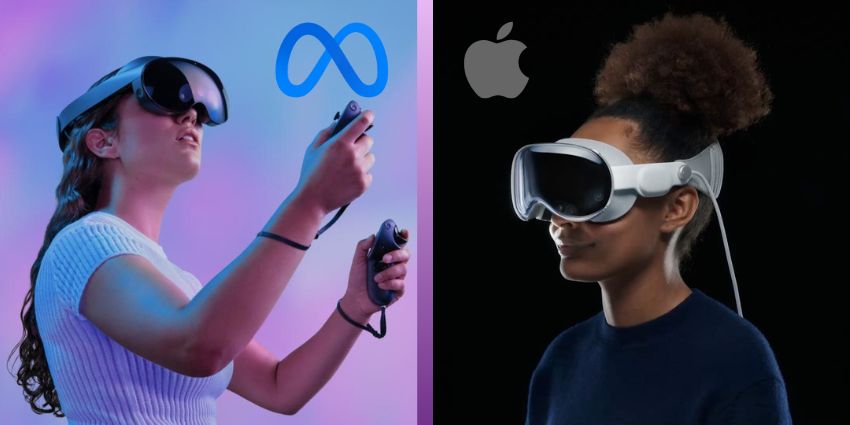I wanted to step away from the typical Reuters-styled banter to speak my mind on the ongoing trend that some media outlets have spearheaded. Many of the articles emerging from this are purporting the death of the Metaverse.
These writers reveal their complete lack of knowledge of the Metaverse and covertly undermine the efforts of an entire industry with clickbait propaganda.
One of the most salient articles catching the attention of the XR community is the pedantic Business Insider article, “RIP Metaverse, We Hardly Knew Ye.” In it, the author surreptitiously evades all knowledge of the Metaverse, who is building it, and even fails to define what it means clearly.
The author, Ed Zitron, has also equated the Metaverse with a handful of Big Tech companies hoping to profit from it. This fallacy consciously overlooks the massive numbers of startups, tech firms, analysts, experts, and others involved in the industry. Instead, he has concentrated his journalistic efforts on a stereotypical dystopia of avatars and social media white elephants from a caricatured Meta, Microsoft AltSpaceVR, and Decentraland.
Like Pontius Pilate washing his hands before his readership, this author, and many others in clickbait journalism, believes he is delivering the will of the people whilst purging his conscience of all responsibility to his readership.
A Myopic Vision for the Metaverse
Limiting his knowledge to merely Meta Platforms, Microsoft, and Decentraland, the article fails to communicate what these companies have proposed regarding their current and future metaverse ambitions.
Articles such as this have been propagated across social media and are lightyears away from what is taking shape in the spatial communications industry. They are damaging and mirror the mindless cacophony of criticism that preceded the explosion of the Internet in the 1990s.
- Don’t forget to catch the XR Awards on 25 May, 2023, where we celebrate the victories of the global immersive industry. Register and sign up for updates at our website.
Since I began work with XR Today two years ago, my consistent duty has been to maintain a scientific and logical approach to understanding XR and the Metaverse.
I will have some difficulties doing that today, but now’s the time to speak up and bring light to dispel the confusion. Let’s start by decoupling Meta Platforms from the Metaverse, once and for all.
Deconstruct the Zuck
Since unveiling that Facebook would shift to Meta Platforms at the Connect 2021 event, the media has de facto placed Zuckerberg front and centre of the Metaverse. Meta Platforms is named so because it was one of the first big tech firms to market itself as a builder of tools, hardware, software developer kits (SDKs), and infrastructure for the Metaverse. Hence, it is merely a platform for the Metaverse, not the Metaverse itself.
Nowhere in Zucker 2021 Founders Letter did he mention he was the Metaverse, nor would he become the centre of it.
Zuckerberg said and wrote at the time,
“The metaverse will not be created by one company. It will be built by creators and developers making new experiences and digital items that are interoperable and unlock a massively larger creative economy than the one constrained by today’s platforms and their policies“
He then clearly defines Meta’s role in developing infrastructure for the Metaverse,
“Our role in this journey is to accelerate the development of the fundamental technologies, social platforms and creative tools to bring the metaverse to life, and to weave these technologies through our social media apps. We believe the metaverse can enable better social experiences than anything that exists today, and we will dedicate our energy to helping achieve its potential“
Concluding, Zuckerberg wrote: “As I wrote in our original founder’s letter: ‘we don’t build services to make money; we make money to build better services.’
From day one, Zuckerberg has never claimed that Meta Platforms is the Metaverse. Like many other companies following his lead, he has dedicated his resources, time, energy, efforts, and reputation to building infrastructure for the Metaverse.
In doing so, he has become the scapegoat for it, with the media casting him out into the desert with the sins of Big Tech. This is eluding a key issue with the Metaverse: it is a community contribution of technological solutions.
One cannot take trips to their favourite destinations without the physical railways, aeroports, cars, trains, planes, roads, or even shoes to move from point A to point B — the same goes for the Metaverse.
Uniting the Industry
Multiple companies, from Meta Platforms, Qualcomm, NVIDIA, Microsoft, HTC VIVE, ByteDance, Sony and even massive telecoms like Nokia and T-Mobile are chipping in to increase adoption rates for spatial technologies. Startups, experts, and even researchers are equally contributing to its development.
Over 35 entities have also joined the Metaverse Standards Forum to help the industry collaborate. Dozens are working with the XR Association, and dozens more are working with the XR4ALL initiative across Europe.
This needs to be front and centre for all media publications, not just Meta. To the latter’s credit, Meta also joined the Forum and has remained active since its induction.
Regularly, many companies speaking directly to XR Today have consistently explained that they want to build towards an interoperable, standardised, and cross-platform metaverse. Their requests stream in on a daily basis.
Death of the Metaverse and the Court of Public (and Private) Opinion
Meta has not only faced the crucible of the media, but also governments, global markets, and even its own shareholders. It has battled advert revenue bans, transnational data rows, haemorrhaging research and development (R&D) costs, slow consumer adoption rates, price point errors for the Meta Quest Pro, over 20,000 layoffs, and even threats of imprisonment from British lawmakers—in just two years time,
This is notwithstanding the Cambridge Analytica scandal in 2016, leading to penalties of up to $5.5 billion between the US Federal Trade Commission and European Union for data privacy violations.
Meta’s venture into the Metaverse is an empirical study from which the entire industry can learn, not a failure. All scientific endeavours require data, sacrifice, learning from mistakes, and typically net-loss investments.
The Death of the Consumer Metaverse?
I would even say that Meta’s biggest error is building the Metaverse using social media tools and failing to leverage the right markets. Analysts believe that consumers may adopt the Metaverse much later than enterprises.
When launching the Quest Pro, Meta correctly decided its initial profits would remain slow as enterprise XR adoption rates surpassed consumer markets.
This is due to firms having a deeper knowledge of investing in XR and metaverse tools by communicating ROI and learning where best to build use cases with positive results.
Meta has even begun collaborating with massive automakers like the BMW Group to compete with Magic Leap, Microsoft HoloLens 2, and HTC VIVE Flow headsets. It has struck partnerships with Accenture to fully onboard new hires with over 60,000 headsets, leading to rapid upskilling results.
Developing solutions for business-to-business (B2B) or business-to-business-to-consumer (B2B2C) will allow companies like Meta to apply their immersive solutions carefully to the market, leading to greater adoption. This contrasts his original ‘will of the people’ approach to social media metaverses.
The consumer market will trail the enterprise as the latter rapidly mobilises its use cases into a working, functioning metaverse. Think ‘duct tape,’ ‘microwave ovens,’ and ‘computers,’ which the military invented and are now used every day by consumers.
To achieve this, firms entering the metaverse market face challenges with the real-world consequences of building their vision. Meta fully knows this and has communicated its findings in a recent research partnership with Deloitte. This is a great step forward in fully communicating and assessing the Metaverse’s viability and ROI.
Laying the Foundation for the Metaverse
Zitron also arrogantly claims that Zuckerberg never had “any real interest” in the Metaverse “because he never seemed to define it beyond a slightly tweaked Facebook with avatars and cumbersome hardware.”
Despite price rises, this simplistic argument belies that the Meta Quest 2 is still the top-selling headset worldwide. This also fails to include the more ergonomic Quest Pro, the Quest 2’s enterprise-level successor.
Also, the biggest price Meta has paid, notwithstanding penalties from the EU and FTC, is its research and development (R&D) expenses. Reality Labs has footed the largest bill across the company, losing over $10 billion in costs alone. Unrealistic post-COVID sales expectations have also hurt not just Meta, but the entire industry.
- Don’t forget to catch the XR Awards on 25 May, 2023, where we celebrate the victories of the global immersive industry. Register and sign up for updates at our website.
However, its investments are paving the foundation for this new infrastructure. Meta has created multiple emerging technologies, including hyperrealistic avatars, AI-powered Research SuperCluster, haptic gloves, and generative AI content creation platforms. Other metaverse firms are achieving the same, namely firms like British XR startup Improbable, dramatically increasing simultaneous user engagement on a single platform.
These investments are key to making the industry work and advance. Many are facing hardships not due to their innovations, but the economic downturn and deaths of Silicon Valley, Silvergate, and Signature Bank.
Both small and large contributors drive the Metaverse, and the death spiral of many SMEs, coupled with mass layoffs, has posed significant existential threats to this.
However, if the Metaverse is dead, then, upon request, could the media identify the body to the authorities? Do they even understand what death, or even the Metaverse, entails?
Death of the Metaverse? Let’s Get on the Same Page
Another major problem with clickbait media postulating as authorities on the Metaverse is the complete lack of knowledge of what it entails. Fringe media pundits, simply referencing Neal Stephenson’s ‘Snow Crash,’ will not cut it anymore.
A clearer, more profitable definition for the Metaverse follows,
The Metaverse is a series of interoperable, cross-platform, and standardised ecosystems of technologies, leading to the merger of spatial communications and the internet for multiple purposes
For the Metaverse to exist, it requires standards similar to the HTTP protocol for the internet. Hardware manufacturers must facilitate device interoperability to cross-communicate, interact, and port creative content.
Imagine an internet where only Apple computers can connect to the web. What would happen if, theoretically, Meta Platforms dominated the Metaverse, forcing content creators to pay tithes to Lord Zuckerberg?
Conversely, how would the Metaverse develop if content creators, struggling to work with companies siloing all spatial platforms, formed a ‘Linux’ of metaverse technologies? This is the reality that companies face and hence, the need for transnational organisations to open dialogue on how best to build the Metaverse.
A Web3’s Worth
Meta’s Vice President of Policy, Rob Sherman, even noted that the Metaverse was in its infancy, stating,
“While the metaverse is still in the early stages of development, it’s already possible to see its potential in areas like education, gaming, wellness and commerce. As metaverse technologies are more widely adopted more economic opportunities will emerge such as opening up new markets and business models, creating better ways of working and transforming training and development.”
This is the right approach and Meta should have communicated this from the beginning, rather than catering only to its social media user base.
Sherman is stating exactly what tech giants like Lenovo have been preaching for over a year. Communicate the ROI of the Metaverse incrementally and with use cases to determine its true progress and value to end users.
No longer is the industry lost in the vision of the Metaverse. It must now take on a scientific, incremental, and transparent approach to evolve.
Failing to do so, the sector will suffer from both walled gardens and urban sprawls of metaverse technologies, leading to blight and decay—and subsequently, abandonment from developers and end-users.
Industry vs Social Metaverse Communities
Furthermore, when media outlets proclaim the Metaverse is dead, they should clarify the one they’re discussing. Yes, the media has documented failures among the consumer-facing metaverse, which includes Meta, JP Morgan, Decentraland, Microsoft, and others.
One cannot deny the shift in focus from the non-fungible token (NFT)-driven, community-based metaverse to the future-proof industrial and enterprise metaverse. The latter is already here, coalescing and thriving.
For example, NVIDIA and Siemens’ partnership has developed digital twins of entire factories using the former’s Omniverse metaverse platform. This is leading to incredible, time-lapsed, and real-time monitoring of factory activities. Unity has also joined in on the industrial metaverse to deliver tangible results.
This has triggered immense demand among telecoms. Nokia, Ericsson, T-Mobile, AT&T, Verizon, and even Huawei and China Mobile have begun scaling up their emerging technologies stack.
This aims to facilitate the influx of bandwidth demand, leveraging edge and cloud computing technologies. Large-scale metaverse experiences cannot take place without support from telecoms and their networks.
On a macroeconomic scale, reports have already detailed that the global metaverse industry, not just XR market, is expected to grow by 44.8 percent annually, topping $205.3 billion in 2023 alone.
- Don’t forget to catch the XR Awards on 25 May, 2023, where we celebrate the victories of the global immersive industry. Register and sign up for updates at our website.
Sectors already flourishing from this include training and upskilling, architecture, engineering, and construction (AEC), computer-aided design (CAD), entertainment and gaming, medicine, education, and even defence.
These sectors acknowledge the need for both proprietary and open-source solutions to continue upward trends in metaverse technologies and profitability. Also, as companies incorporate generative AI technologies for content creation, demand has skyrocketed for these solutions.
Drawing a Line in the Sand(box)
Concluding, there’s far too much misinformation surrounding the Metaverse. To preserve this emerging technology, the world now has the internet as its forum to discuss its direction.
Articles such as the one cited here need a healthy dose of dialectics to sort out their misguided analysis of technologies still in their infancy.
Personally, I would hate to see specific media outlets continue to ignore 95 percent of all Metaverse firms progressing their solutions across the market. This proverbial brainchild being raised is not stillborn, but a flourishing industry with a longer-than-reported timeline for maturation, facing setbacks but not defeat.
With the abysmal attention spans prevalent in clickbait journalism, it will take protracted efforts to set the records straight.
The media has already rallied around generative AI platforms such as ChatGPT, DALL-E, and Stable Diffusion. However, failure to deeply analyse the direction of these technologies will lead to the same cycle of love-bombing, devaluation, and discard. Quoting George Santayana: “Those who do not learn history are doomed to repeat it.”
As a personal commitment to this, I am launching a regular weekly to fortnightly article to play Whack-A-Mole with the media. Certainly, I don’t have all the answers and will not pretend to do so. However, I have the support of many people across the industry who are more than willing to chip in on the chinwag.
I will select an article, perform my vivisection, and post it on social media to receive input from the industry itself. Starting today, I will also leverage XR Today as a platform to curate the Metaverse and defend it.
Sincerely,
Demond Cureton
Senior Journalist
XR Today
The views in this analysis piece are solely those of the author and do not reflect the XR Today brand, its partners, or affiliates.







